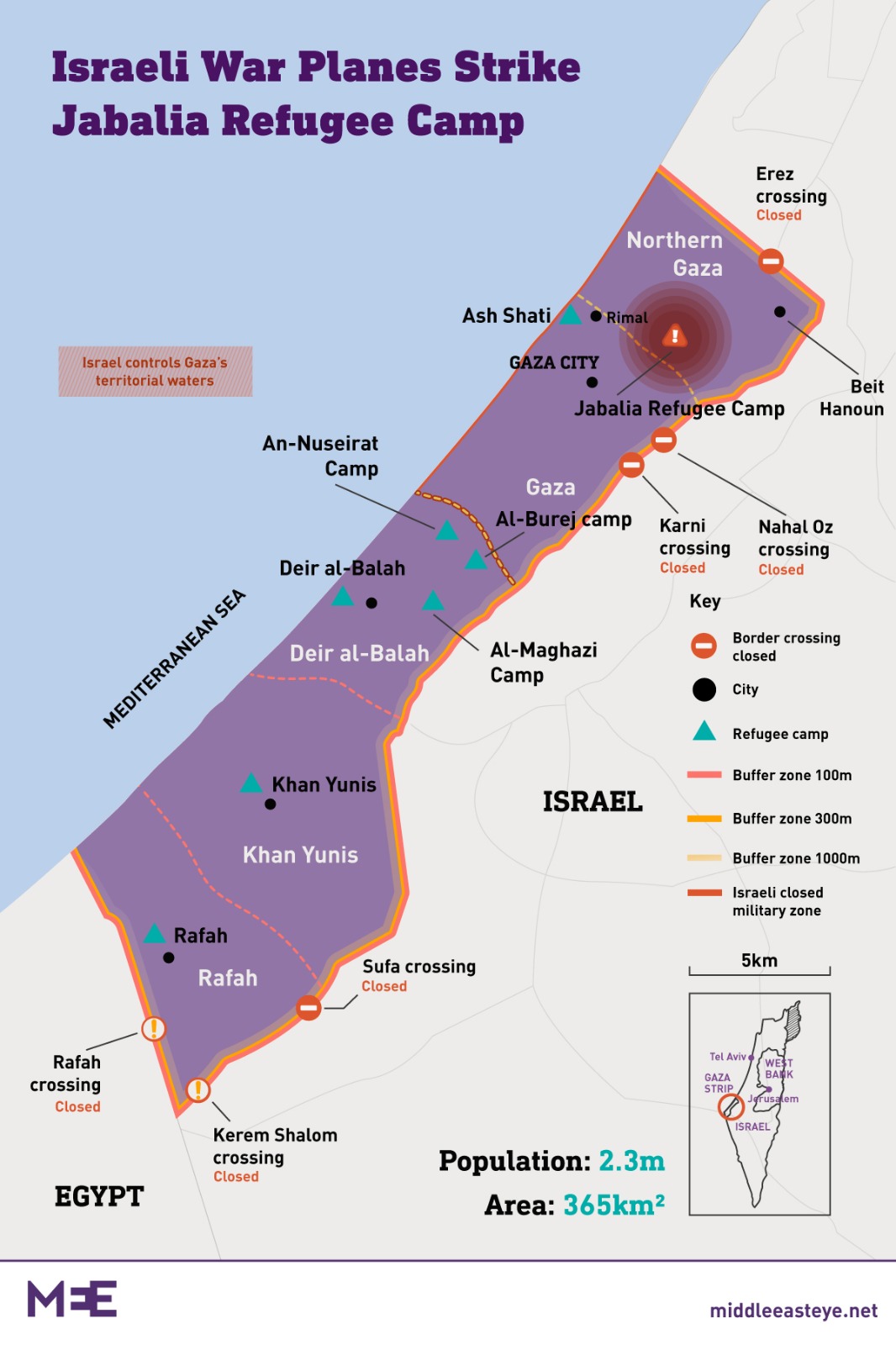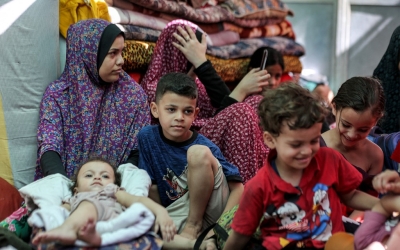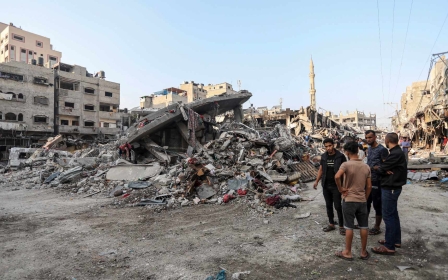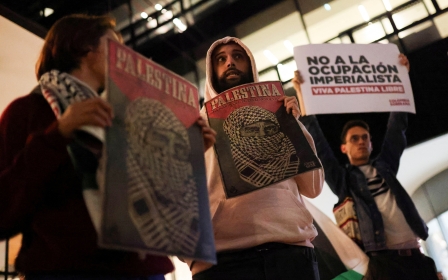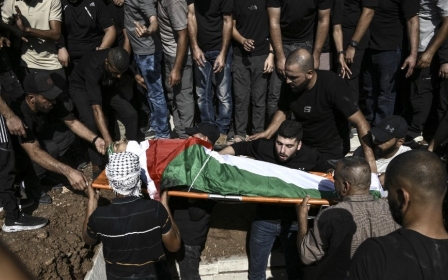Israel-Palestine war: Blinken told to help end 'madness' as Israel bombs schools
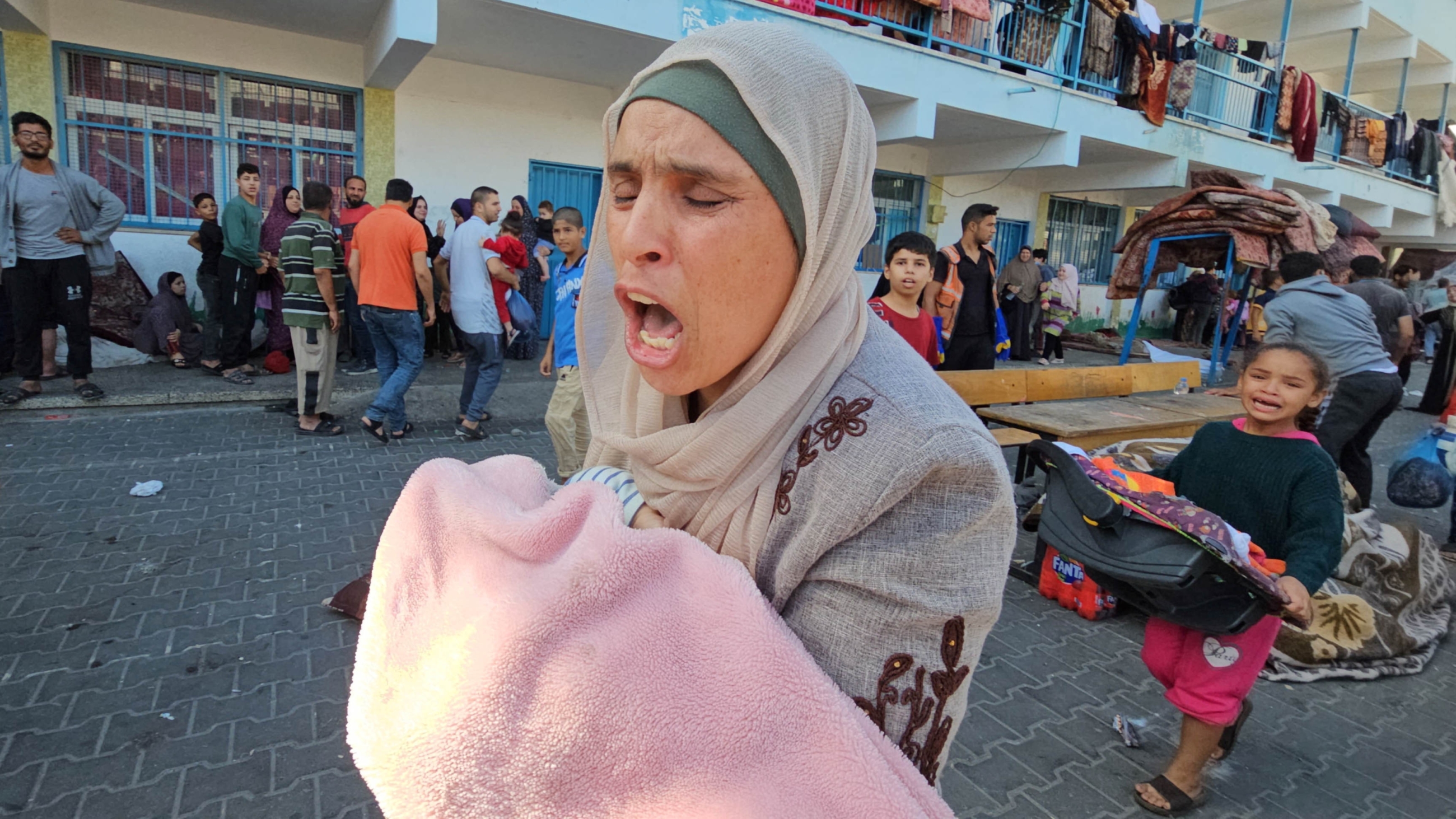
Israeli war planes on Saturday struck al-Fakhoura school in Gaza's densely populated Jabalia neighbourhood, killing at least 15 people and wounding dozens more, the Palestinian health ministry reported.
Thousands of Palestinians, who had fled their homes due to bombing, were sheltering in the school when the missiles struck, leaving craters in the courtyard and causing panic.
Victims of the bombing were mostly women and children sitting in the schoolyard, according to a health ministry official, who said they "were torn to pieces" and "their bones and flesh were collected in plastic bags".
Israeli bombs also targeted al-Quds hospital, while Kamal Adwan Hospital in northern Gaza shut down after its generator stopped working due to fuel shortages.
Al-Nasr Children's Hospital, the only one of its kind in the besieged enclave, was also targeted.
Ashraf al-Qudra, a spokesperson for the Palestinian health ministry, said that 16 hospitals in Gaza were rendered out of service, while 105 medical facilities had been targeted.
The health ministry also said that around 2,200 people, including 1,250 children, are buried under the rubble of destroyed buildings in Gaza and that one Palestinian in Gaza has been killed every four minutes since the start of the war.
Israeli missiles also targeted the home of Hamas leader Ismail Haniyeh, who is not at present in Gaza, according to the Reuters news agency.
The death toll of Israel's most aggressive bombing campaign in Gaza has reached 9,448 since the start of the war on 7 October, including 3,900 children and 2,500 women.
Local Palestinian media reported that Israeli bombing was intentionally targeting vital services, including mosques, solar panels, generators and hospitals, as well as water tanks. Gaza's Al-Azhar University was also bombed, seen in footage shared widely online.
The al-Qassam Brigades, Hamas's armed wing, announced that they killed five Israeli soldiers and wounded several others in a building northwest of Gaza City.
Follow our live blog for all the latest on the Israel-Palestine war
Meanwhile, another exchange of fire took place at the Israel-Lebanon border, with the Israeli army saying it attacked Hezbollah targets.
In response, rockets were launched from southern Lebanon towards areas near Israel's northern border.
Hezbollah's leader, Hassan Nasrallah, on Friday warned Israel against any major operation against Lebanon, saying that "all options are on the table on the Lebanese front".
Blinken meets regional foreign ministers
On Saturday, in Jordan's capital Amman, US Secretary of State Antony Blinken met with the Saudi, Qatari, Emirati, Egyptian and Jordanian foreign ministers.
The Arab leaders publicly pressed Blinken to secure an immediate ceasefire in Gaza, with the Jordanian Foreign Minister Ayman Safadi telling a news conference: "Right now we have to make sure that this war stops."
"We need to work together . . . to stop this madness," Safadi said, adding that it was crucial the international community stopped a "catastrophe that will haunt the region for generations".
In a rare open display of disagreement, the US's top diplomat pushed back, telling the conference that a ceasefire would only let Hamas regroup and launch more attacks on Israel.
"A ceasefire now would simply leave Hamas in place, able to regroup and repeat what it did on 7 October," said Blinken, on his second trip to the region since the war began.
"No nation, none of us would accept that."
Blinken said all agreed on the need for peace and that the current status quo in Gaza could not hold, but he acknowledged there were differences between Washington, which has called only for pauses to let aid into Gaza, and its allies.
Speaking about sparing civilians and speeding up aid deliveries, Blinken said: "The United States believes that all of these efforts will be facilitated by humanitarian pauses."
Axios reported on Saturday that Blinken told his Israeli counterparts that accepting a humanitarian pause in the conflict would ease pressure on Washington over its support of Israel, and also help give Israel more time for its ground campaign in Gaza.
"We don't want to stop you, but help us help you get more time," one US and two Israeli officials said was Blinken's message.
Blinken will also visit Turkey for two days from Sunday.
Ankara on Saturday recalled its ambassador to Israel in view of "the ongoing humanitarian tragedy in Gaza caused by continued attacks on civilians and Israel's refusal [to accept] a ceasefire," the Turkish foreign ministry said.
Separately, the Israeli foreign ministry lashed out at the Honduran government's decision to recall its ambassador to Israel over the indiscriminate bombardment of the Gaza Strip.
According to Israeli media, Lior Haiat, the foreign ministry spokesperson, said: "We expect the Honduran government to condemn Hamas, to support Israel's right to defend itself, and not to take decisions that provide support to Hamas's terrorism."
Calls for ceasefire
In London, hundreds of people gathered outside the BBC offices to demand a ceasefire and criticise the network's coverage of the war. A sit-in was also staged in Oxford Circus, one of the busiest parts of the capital.
Calls for a ceasefire have intensified as Israel presses on with its bombing and ground campaigns in Gaza.
More than 600 academics and scholars co-signed an open letter, demanding that universities in Ireland suspend all ties with Israel.
"The dehumanising language and tropes widely used by Israeli leaders in reference to Palestinians echo those typically associated with genocidal incitement and intent," the letter read.
Middle East Eye propose une couverture et une analyse indépendantes et incomparables du Moyen-Orient, de l’Afrique du Nord et d’autres régions du monde. Pour en savoir plus sur la reprise de ce contenu et les frais qui s’appliquent, veuillez remplir ce formulaire [en anglais]. Pour en savoir plus sur MEE, cliquez ici [en anglais].


